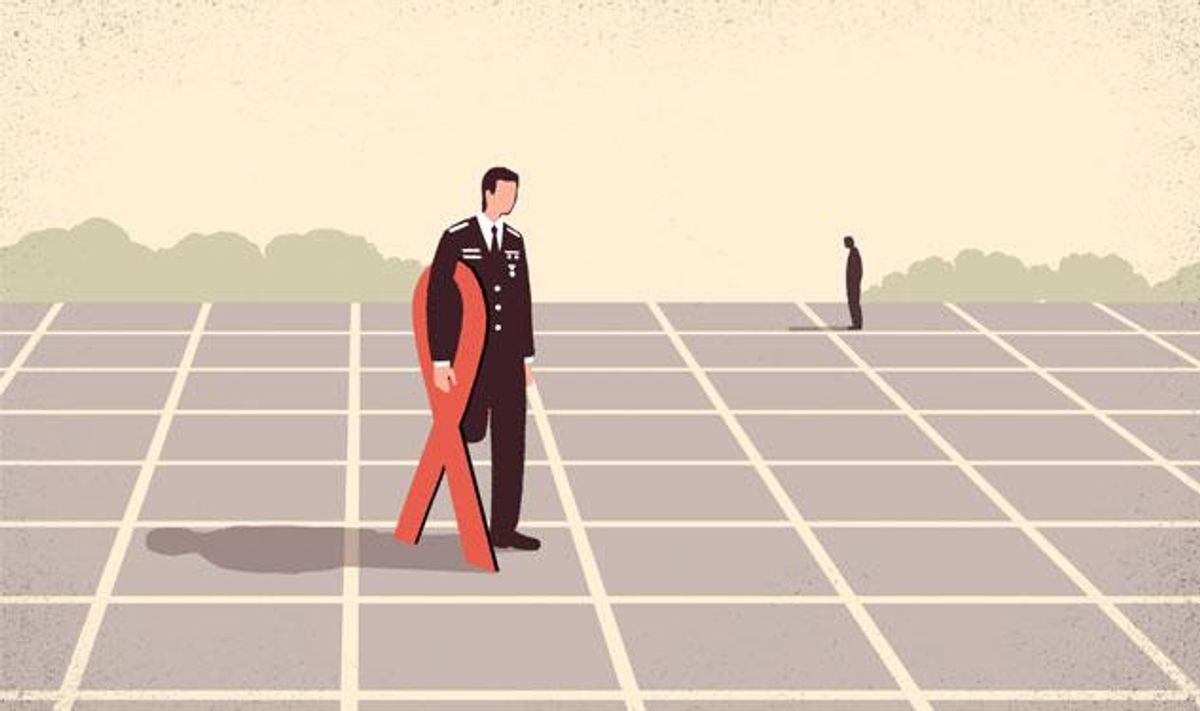
The bittersweet life of the long-term AIDS survivor
December 01 2014 10:00 AM EST
January 25 2017 4:24 AM EST
By continuing to use our site, you agree to our Private Policy and Terms of Use.

The bittersweet life of the long-term AIDS survivor
Illustration by Davide Bonazzi
Americans are tired of AIDS. On a Monday and Tuesday in September, the AIDS Memorial Quilt was displayed on New York's Governors Island (could there be a less convenient time or place?), and perhaps 20 of us, all long-term survivors, wandered the voids separating blocks of patchwork, lost in thought, until a slow-moving cyclist eyeing the panels blew a whistle to get us out of his way.
AIDS continues to characterize the lives of many of us. It buried our youth under a garbage heap of grief, terror, medical equipment, and funeral arrangements. It is in us -- the virus, yes, but more to the point, the memory of what it did.
Our youth was spent catering to the intimate physical and emotional needs of dying loved ones -- men and women with emaciated, ashen bodies rotted by cancers that medical professionals hadn't seen for centuries; with lesions, tumors, and weeping wounds for which no amount of gauze was sufficient. We stood in showers, supporting bodies that buckled like marionettes as we washed them. We clasped their hands, comforted them, and joined them in their confusion, humiliation, and sadness. We held on to the possibility -- tried to breathe air into it, for them and for ourselves -- that ahead of us, in the next life perhaps, there might be something other than anguish.
And all the while, we were fighting to stay alive ourselves.
Now, like veterans of an unpopular war, we sense that people want to eradicate these experiences from their memory. Civilians once again, we're faced with crushing debt, piles of insurance documents, and collection notices from doctors whose names we don't recognize.
Landing a job well-paying enough to topple those piles and cover present-day expenses is nearly impossible, especially for a sexagenarian with a 20-year gap in his resume, who's competing against a 30-year-old. There are also medication side effects to consider: thinning bones, heart disease (or heart attack, in my case, at age 43), and perhaps most frightening, the emerging reality of early-onset cognitive deterioration. (Our minds are going?) Guinea pigs, we wonder what heretofore unimagined surprises might result from swallowing dose after dose of newly created toxins. Tails?
In contrast, we see a younger generation whose lives seem accompanied by a St. Vincent soundtrack, the lyrics to which might be, "Let's fall in love, get married, have a baby. We'll call it Selfie." (A selfie would have held little appeal for us: Hollow cheeks and purple blotches don't evoke thoughts of posterity.) As witnesses to the possibilities inherent in being young and gay today -- part of a group for whom "St. Vincent" arouses an urge to dance, not melancholic memories of a hospital (now luxe condos) -- we view the young with envy. No reasonable person begrudges them their freedom or lightness, but many of us do mourn an experience we never had, or had briefly, only to lose it with an abruptness so stunning it felt like punishment for presuming we deserved it at all.
Yet ugly as AIDS is, it's also created something extraordinarily beautiful: community. Perhaps because society didn't seem to care about, or was even quietly approving of, our situation, we came together. We helped one another up the mountain, extending hands to assist the faltering. Tragedy forced us to recognize how valiant and dignified we are, how capable we are of setting aside what doesn't matter (status, power, money, vanity) in service of what does (love). These are invaluable lessons, but hard-won and heavy to hold. We've reached the summit, but it is a sparsely populated, sometimes lonely place. Looking out, we glimpse lower peaks populated by younger people, who in their less arduous ascent collected, and now enjoy, many of the things we had to leave behind: relationships, linear careers, healthy bodies. Waving to them, we shout that we made it, but our voices won't bridge the gap. And they don't look up.
An extra 20 or 30 years of life is both a gift and a curse. Many of us can't help but wonder, Why did I fight so hard to get here? Answers are being found at organizations like Friends in Deed -- the Crisis Center for Life-Threatening Illness, in New York City (FriendsIndeed.org), and Let's Kick ASS (AIDS Survivor Syndrome), in San Francisco (LetsKickASS.org). In these groups we discover that AIDS robbed us of our youth, but also gave us wisdom, engendered compassion, and taught us what it is to love and be loved. It prepped us for a new journey. Hands are extended.
Want more breaking equality news & trending entertainment stories?
Check out our NEW 24/7 streaming service: the Advocate Channel!
Download the Advocate Channel App for your mobile phone and your favorite streaming device!